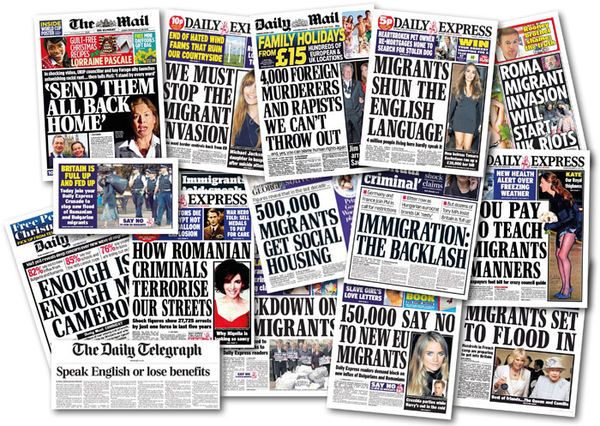
It is a popular opinion to say that the media is racist, it is also a popular opinion to say that the media is biased towards fairness. It is likely that both points of view are true.
One instance where this has been brought to the fore recently was during a football match between Bulgaria and England. During the game Bulgaria fans racially abused English players (note: there was already a partial stadium ban due to previous racist behaviour of fans). The FA and FIFA went for the non-action approach of having a month of anti-racism slogans and events, events which have been going on periodically in England for at least the last twenty years, events which smack of hypocrisy given the 70ish arrests a few days before of English fans for behaviour which closely resembles (almost like-for-like) imperialism and racism, going to another country and acting like it is yours, abusing the locals and, even, literally planting flags. However, the media, who has great power in shaping the story, did what they always do. They went ‘ah, racism…’ and so ran to the first people who they could find who had one thing in common- they were black. One must assume that the thinking was thus- racism= black therefore all black people think alike and so must be offended the same and thusly what happens to one black person happens to all black people and thusly any black person can speak on the behalf of all black people, ignoring a) racism is not just about black people (compare how blacks treat whites in Zimbabwe, for one) it is about all skin colours in all countries, not just majorities as we have seen in counties like Burma where the minority Muslim government ruled, treating Buddhist as though they were less than human which the Buddhist then did in turn, when taking power, to the Muslims. B) not only are people of one skin colour attacked by racism, one person of any skin colour being attacked on the grounds of race is affront to all humanity and c) (although there are many more points to be made on this) deciding if a person is ‘best suited’ does not depend on skin colour, it depends on background, education, experience etc., one might even argue a white civil rights lawyer would understand culture and racism better than a person who just happens to be black. Deliberate or not, this bias towards skin colour is a form of racism.
Racism is not only in the news media. The entertainment media is just as guilty. I recent started to watch the new Disney film Aladdin, part of Disney’s making more money even though they have no new ideas, by remaking the same films, just with humans. The original film, based on the Arabian story from The Thousand and One Night, was a cartoon and thusly some allowances must be made. As cartoons cannot convey the full range of human emotion and thought, often shown by non-verbal signals (Marlon Brando was the favourite actor of many deaf people as his body told more than his words so even those who could not hear his words could understand him fluently) and so the cartoon relies on the archetype. Yet, once you take the (literally) two-dimensional archetype and superimpose it upon a real life human you are still left with a two-dimensional archetype and instead of a full, living, person you are left with a grotesque caricature. That this can happen and that millions are spent on watching the film (Box office: 1.051 billion USD, Budget: 183 million USD (2018) IMDB rating 7/10) just goes to show how such racism is inherent in the media form and how people are so conditioned to accept it as being normal that thusly racism is seem as being normal.
Whilst the media can shape the opinions of society, society also shapes the media. There is a misconception that, in general, England is a Christian country and that Christmas (in my opinion the most Holy of all days as the importance of Christ lies not in the crucifixion but in his life and thusly his birth being the most important event) is a religious occasion, yet it is made up to appear so however the insinuation is clear- England is a white, Christian country, which is complete nonsense. England is a multi-ethnic country which shows both the good and bad of immigration. The good being the coming together of cultures. There is often, quite rightly, resentment that immigrants do not become part of the society they are now in (not to be mistaken with the education camps China has for Muslims to make them ‘Chinese’) but, you tell me (in the comments or via email etc.), why would anyone want to become part of a society which values them less? Did you know the 27th of October is the Hindus, Sikhs, Jains, and some Buddhists, festival of Diwali? One of the holiest days in the year. Did you know that in November it is MILAD UL NABI, the Muslim equivalent of Christmas, the birth of Muhammed? Chances are you didn’t know these, or the many other religious, cultural festivals which have just passed and why is that? It is because the unified, multi-cultural country of England still carries in its heart the racism which led to Imperialism, (don’t believe me? Look at many of the arguments for Brexit) something which, consciously or not, the media perpetrate also, abdicating their moral responsibility to create a culture free from the very things they claim to oppose.
‘till next time




